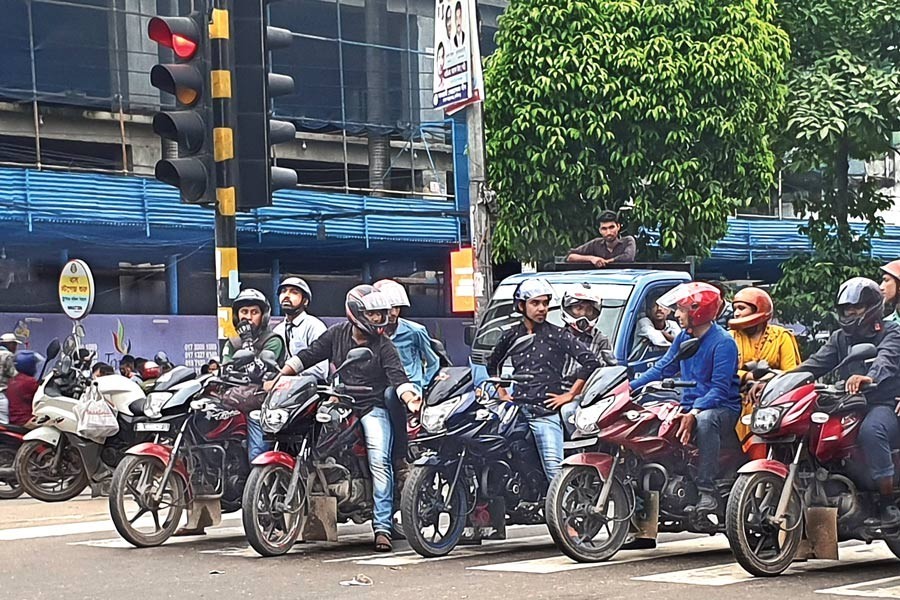Ride-sharing still poorly regulated
Riders turn off service apps, carry passengers for contract fares to earn more

Published :
Updated :

Ride sharing service providers seen dominating city roads. The photograph was taken from Kakrail intersection in the city on Friday — FE photo
The on-demand app-based ride-sharing services are popular but still poorly regulated in Dhaka for lack of strong monitoring by the authorities concerned.
Dhaka is one of the most congested among cities in South Asia in terms of its traffic mess.
Unwelcoming incidents often occur due to wild driving, unskilled drivers and operation of such service on a contract basis in breach of traffic rules.
On August 26, a rider, Milon, was stabbed to death by a mugger who got onto the victim's bike in disguise of a customer in Malibagh area.
The suspected mugger later snatched away his motorcycle.
Police told the media that it would be easy to find the killer if the driver would have run his app instead of a contract service.
This correspondent visited multiple busy intersections and areas in the city only to see riders turn off their service apps to find contract fares.
The FE asked several riders regarding this testy issue.
One rider at Kakrail intersection said they can pocket the total fare charged if they take customer on a contract basis.
Even ride-sharing companies have stopped promotional and other offers to the vehicles registered with them in operating services to earn extras.
The man, however, acknowledged it to be unprofessional and it could imperil bikers and customers alike.
On the other hand, business insiders blame the government for framing a weak-kneed policy for riders compared to that of service-providing companies.
Even the state-run Bangladesh Road Transport Authority (BRTA) said the monitoring job lies with the companies, they alleged.
Shariful Islam Tareq, a senior manager of Dhaka-based ride-sharing firm Piikmee, said a rider has to take a registration card from BRTA on behalf of his or her companies.
There has been a growing trend in running the service on a contract basis following a halt to promo offers as companies are hardly making profits now, he mentioned.
Crooked riders take this mechanism to earn extras unethically, depriving operators of profits, Mr Tareq told the FE.
He also accentuated the need for establishing an e-training institute for drivers to address this problem.
Traffic police can help monitor whether ride-sharing motorbikers are using apps, the official observed.
He sought cooperation from the government to beef up monitoring to help boost the promising sector.
Besides, customers and companies have put stress on the launch of a proposed hotline immediately.
Once the service is launched, Mr Tareq hoped, it would allow subscribers to seek help from law enforcement by simply dialing a hotline number.
Mizanur Rahman, a civil engineering professor at Bangladesh University of Engineering and Technology, said the city has yet to make a significant change in its commute system.
Strong monitoring aside, he suggested a more public transport facility here.
Mr Rahman said the increased number of motorbikes brought an additional pressure on the city's streets which would soon give birth to other problems.
When asked, BRTA director (engineering) Lokman Hossain Mollah said it is the operators' duty to monitor and create awareness among users to follow traffic rules.
"We've already issued letters to the ride-sharing companies with regard to make drivers aware of using apps accordingly," he told the FE.
Besides, contract-based service puts both customers and drivers' lives at risk, shared Mr Tareq and Mr Mollah.
Dhaka started app-based riding service in May 2015.
According to a Policy Research Institute study in 2018, the market size of the ride-sharing industry in Bangladesh is worth an estimated Tk 22 billion.
The service covers roughly 23 per cent of the transport sector in the country, the report added.
nsrafsanju@gmail.com


 For all latest news, follow The Financial Express Google News channel.
For all latest news, follow The Financial Express Google News channel.